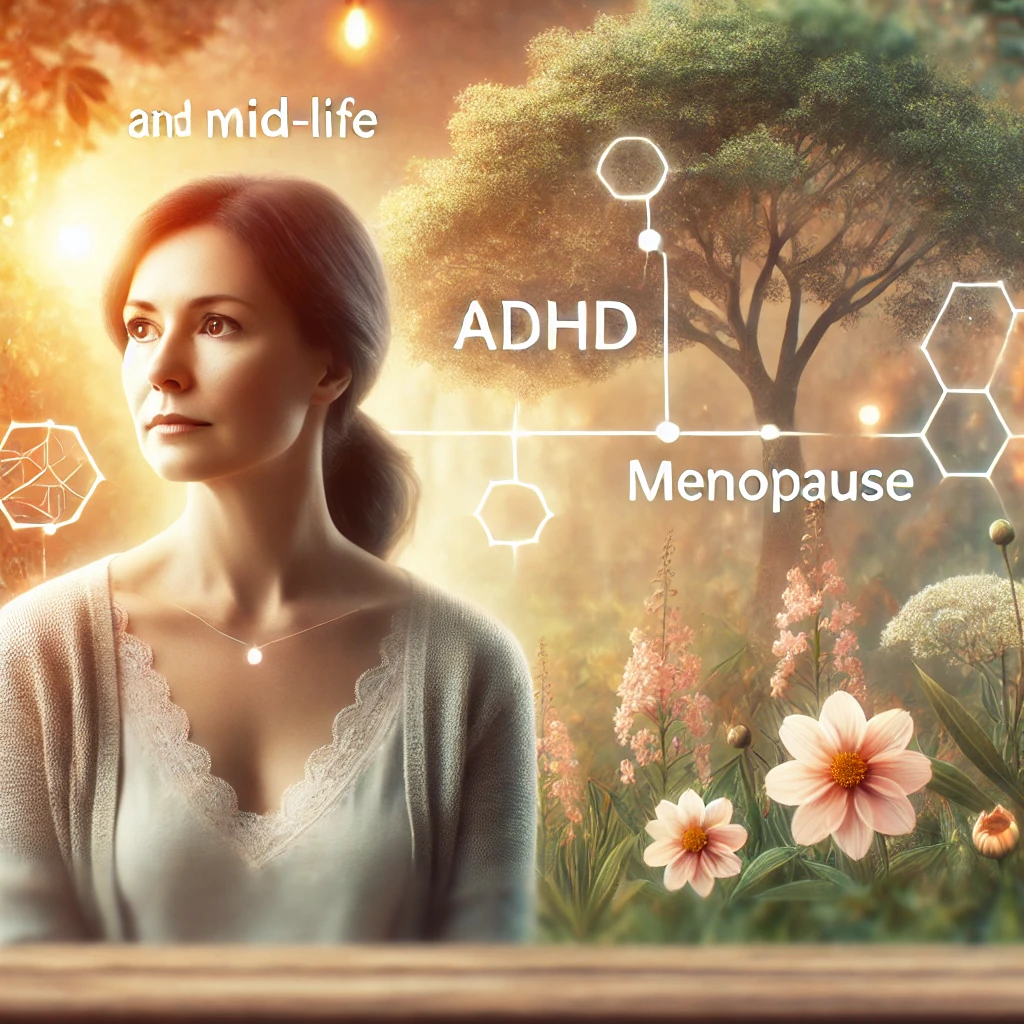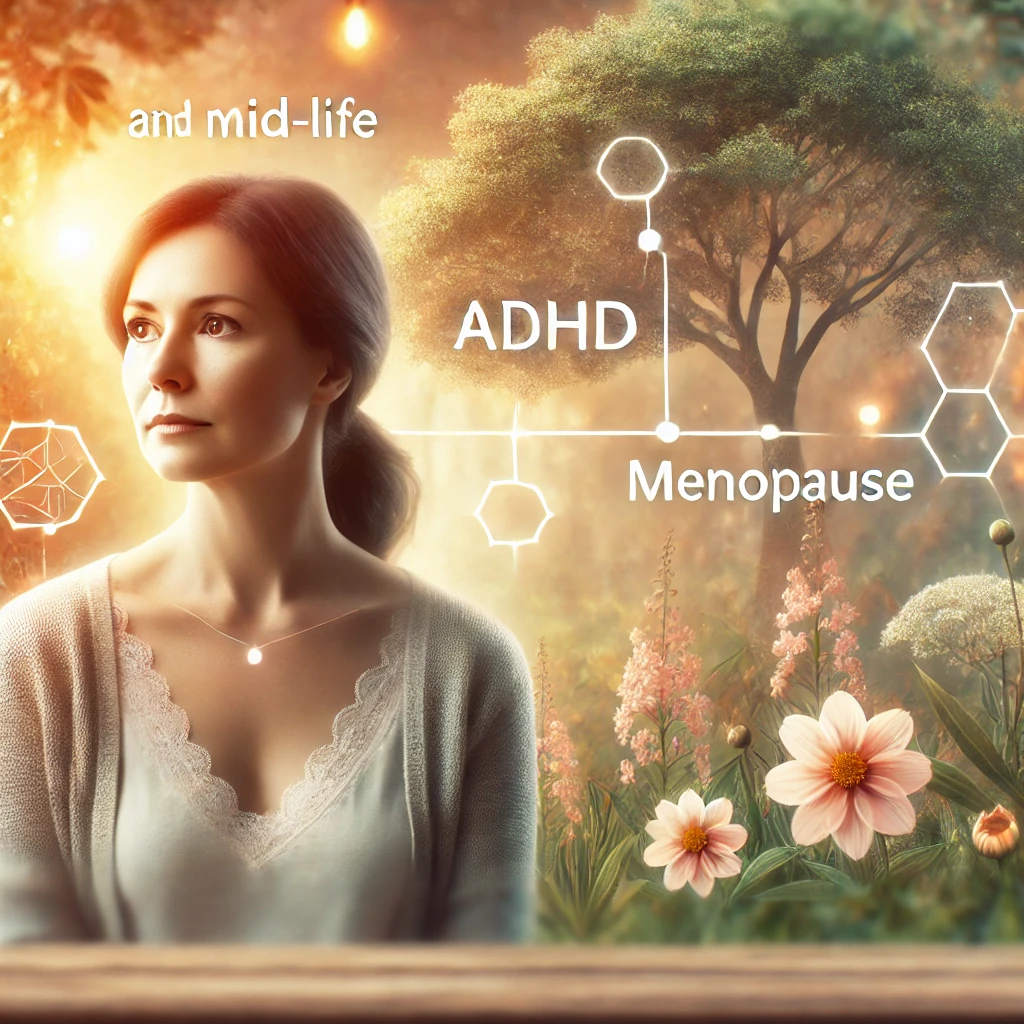
Key Takeaways From This Blog: 🧠 ADHD and Menopause - The 4 Most Important Things to Know
- Menopause Can Worsen ADHD Symptoms: The hormonal changes during menopause can exacerbate ADHD symptoms like forgetfulness, distractibility, and disorganization. This occurs because a decrease in estrogen levels impacts dopamine availability, crucial for individuals with ADHD.
- Medication Adjustments May Be Necessary: Women with ADHD undergoing menopause may need to adjust their medication dosage or type. Working closely with a healthcare provider is essential to find the most effective treatment plan.
- Self-Care Is Crucial: Both menopause and ADHD can be overwhelming. Prioritizing self-care is crucial and can include regular exercise, adequate sleep, stress-reduction techniques like mindfulness, and maintaining a healthy diet.
- Hormone Replacement Therapy May Help: HRT can be beneficial for managing menopausal symptoms, including mood swings and hot flashes, and may also impact ADHD symptoms. Monitoring changes and adjusting treatment with a healthcare provider is important.
🌀 Understanding Menopause
Menopause is a natural biological process marking the end of a woman's reproductive years. It is defined as the point in time when a woman has gone 12 consecutive months without a menstrual period, typically occurring between the ages of 45 and 55. The period leading up to menopause, known as perimenopause, involves significant hormonal fluctuations and changes in monthly cycles, hot flashes, and other symptoms. After menopause, a woman cannot become pregnant naturally.
🔍 Common Symptoms of Menopause
- 🌡️ Hot Flashes: Sudden feelings of warmth, often most intense over the face, neck, and chest.
- 🌙 Night Sweats: Hot flashes that occur during sleep, often leading to sweating and discomfort.
- 📆 Irregular Periods: Changes in menstrual cycle patterns, including missed periods or changes in flow.
- 💧 Vaginal Dryness: Decreased moisture and elasticity in vaginal tissues, which can cause discomfort during intercourse.
- 😠 Mood Changes: Increased irritability, anxiety, or depression.
- 🛌 Sleep Problems: Difficulty falling asleep or staying asleep, often due to night sweats or other discomforts.
- ⚖️ Weight Gain: Changes in metabolism that can lead to weight gain, particularly around the abdomen.
- 💇 Thinning Hair and Dry Skin: Changes in hair and skin texture and moisture.
- 🤱 Loss of Breast Fullness: Changes in breast tissue, leading to a loss of fullness.
- ❌ Decreased Libido: Reduced interest in sexual activity.
💡 The Impact of Perimenopause and Menopause on ADHD Women
🧠 Estrogen and Dopamine Regulation
Estrogen plays a crucial role in regulating dopamine, a neurotransmitter essential for attention, motivation, and executive function, often deficient in individuals with ADHD. During perimenopause and menopause, estrogen levels fluctuate and eventually decline, reducing dopamine availability in the brain. This decline can exacerbate ADHD symptoms such as forgetfulness, distractibility, and disorganization. Estrogen also affects serotonin, influencing mood and emotional regulation.
😟 Progesterone and Mood Regulation
Progesterone, another key hormone, also influences mood and cognitive function. Fluctuations and declines in progesterone during menopause can contribute to mood swings, anxiety, and depressive symptoms. These hormonal changes can make emotional regulation even more challenging for women with ADHD, who may already experience heightened sensitivity to emotional stressors.
🧩 Cognitive and Emotional Impacts of Menopause on ADHD women
🔍 Memory Problems and Brain Fog
Cognitive symptoms, such as memory problems and brain fog, can become more pronounced during menopause. The decline in estrogen can impair cognitive functions, making it harder for women with ADHD to stay organized and focused.
😔 Increased Anxiety and Depression
Women with ADHD are at a higher risk of experiencing anxiety and depression during perimenopause and menopause due to hormonal changes. This is particularly true for those with a history of mood disorders or heightened sensitivity to hormonal fluctuations.
💤 Physical Symptoms and Sleep Disturbances
💤 Sleep Problems
Sleep disturbances are common during menopause and can further impair cognitive function and exacerbate ADHD symptoms. Night sweats and other menopausal symptoms can lead to poor-quality sleep, making it even harder to manage ADHD symptoms effectively. Sleep disruption exacerbates executive functioning issues including mood and emotional regulation issues, complicating the picture for ADHD women.
😴 Fatigue
Increased tiredness due to hormonal changes and sleep issues can reduce motivation and energy levels, impacting daily functioning and productivity.
What are the treatment options for adhd and menopausal women?
💉 Hormone Replacement Therapy (HRT) and ADHD
Women get diagnosed as having anxiety and depression during this time rather than ADHD. Some even get diagnosed with dementia; advocating for yourself is essential. Although a very popular study,the Womens Health Initiative suggested, this it has since been debunked. It looks like the sooner you can get on treatment, the better you will be.
HRT has even been shown to be protective against long covid in one study!
🌟 Benefits of HRT
HRT can be beneficial for managing ADHD symptoms in women undergoing perimenopause and menopause. By stabilizing estrogen levels through HRT, women may experience improved dopamine function, which can alleviate ADHD symptoms. HRT can also help stabilize mood, improve cognitive function, and reduce sleep disturbances.
⚠️ Risks of HRT
HRT is not without risks. Although they have been overblown in the media and often for younger women, the benefits outweigh the risks. Discussing these risks with a healthcare provider and weighing them against the potential benefits is crucial.
💊 Medication Efficacy During Menopause
⬇️ Reduced Effectiveness
Medication for ADHD can become less effective during menopause due to hormonal changes. The decline in estrogen levels can reduce the effectiveness of ADHD medications, which typically work by increasing dopamine levels in the brain.
🔄 Medication Adjustments
Women may need to adjust the dosage or type of their ADHD medication during menopause. This should be done under the guidance of a healthcare provider to find the most effective dose while minimizing side effects. Combining ADHD medication with Hormone Replacement Therapy (HRT) can help stabilize hormone levels and potentially improve the effectiveness of ADHD treatment.
🔄 Stress and ADHD Symptoms During Menopause
⚠️ Additional Life Stressors
The period of perimenopause and menopause often coincides with significant life stressors that can exacerbate ADHD symptoms. These include:
- 🏡 Children Leaving Home: The "empty nest" syndrome can bring feelings of loss or anxiety, adding emotional stress.
- 📈 Career Pressures: Success in one's career can lead to increased responsibilities and stress. The challenge of balancing work demands with personal life, particularly during a time of hormonal changes, can be overwhelming.
- 👵 Caring for Aging Parents: Many women in this age group are also responsible for caring for aging parents, which can add to the emotional and physical burdens.
🧠 Cognitive Function
Stress can worsen difficulties with attention and focus, which are already common in individuals with ADHD. The hormonal changes during menopause can further amplify these issues, making it harder to concentrate and stay organized.
😥 Emotional Regulation
Stress can heighten feelings of anxiety and depression, which are common comorbidities in women with ADHD. The hormonal fluctuations during menopause can make emotional regulation even more challenging, leading to mood swings and increased emotional sensitivity.
🌿 Managing ADHD and Menopause naturally
🧘♀️ Stress-Reduction Techniques
Incorporating stress-reduction techniques such as mindfulness, meditation, yoga, and deep-breathing exercises can help manage stress levels and improve overall well-being.
🏃♀️ Regular Exercise
Physical activity can help reduce stress, improve mood, and enhance cognitive function. Regular exercise can be particularly beneficial for managing both ADHD and menopausal symptoms.
Natural supplements
Some studies have shown that black Cohosh and yams are helpful for some women.
🍏 Healthy Diet
A balanced diet rich in nutrients can support overall health and help manage stress. Avoiding excessive caffeine and sugar can also help stabilize mood and energy levels.
😴 Adequate Sleep
Prioritizing good sleep hygiene can help mitigate the impact of stress on sleep quality. This includes maintaining a regular sleep schedule, creating a restful sleep environment, and avoiding stimulants before bedtime.
👥 Support Systems
Seeking support from friends, family, or support groups can provide emotional relief and practical advice for managing stress and ADHD symptoms during menopause.
👩⚕️ Professional Help
Consulting with healthcare providers, therapists, or counselors can provide personalized strategies and treatments to manage stress, ADHD, and menopausal symptoms effectively.
💬 Addressing Stigma and Misconceptions for Menopausal Women
There can be a stigma associated with both ADHD and menopause, often leading to misconceptions about women's experiences and needs during this time. It's important to challenge these misconceptions and promote understanding among healthcare providers, friends, and family members. This includes recognizing that ADHD is a legitimate condition that can significantly impact daily life and acknowledging the real physical and emotional changes that occur during menopause.
🔄 Continuous Monitoring and Adjustment of Treatment
Given the dynamic nature of both ADHD and menopausal symptoms, continuous monitoring and adjustment of treatment plans are crucial. Regular check-ins with healthcare providers allow for timely modifications to medication and therapy approaches, ensuring that the treatment remains effective and responsive to changing symptoms.
💡 What Treatment Providers Should Do for ADHD Women in Menopause
Treatment providers have a crucial role in supporting women with ADHD during menopause. Key actions include:
- Understanding the Interplay of Hormones and ADHD: Providers should be well-versed in how hormonal fluctuations, especially the decline of estrogen, can exacerbate ADHD symptoms. Recognizing these changes is essential for accurate diagnosis and treatment.
- Recognizing Menopause's Mimicry of ADHD: Cognitive and emotional changes during menopause can resemble ADHD symptoms, potentially leading to misdiagnosis. Providers should be cautious and consider the full hormonal and health context.
- Assessing Hormonal Status: Consideration of a woman's hormonal status and menstrual cycle phase is crucial when evaluating for ADHD or adjusting treatment plans. Collaborating with other healthcare providers, such as gynecologists, can provide a complete picture of the patient's health.
- Incorporating Hormonal Treatment Options: Exploring hormonal treatments, like estrogen replacement therapy, may be beneficial for women whose ADHD symptoms are significantly impacted by hormone fluctuations.
- Educating and Advocating: Providers should educate patients about the impact of menopause on ADHD and advocate for increased research and awareness in this area.
🤝 What Friends and Family Should Do for ADHD Women in Menopause
Friends and family are vital in supporting women with ADHD during menopause. They can:
- Provide Emotional Support: Offer understanding and empathy, acknowledging the challenges faced during this time.
- Help with Organization and Reminders: Assist with setting up calendars, reminders, and daily tasks.
- Encourage Healthy Lifestyle Choices: Support regular exercise, a balanced diet, and adequate sleep.
- Respect Their Need for Space and Time: Understand that some days may be more challenging than others and provide space when needed.
- Educate Themselves: Learning about ADHD and menopause can help provide better support and understanding.
- Encourage Professional Help: Encourage seeking professional guidance when necessary.
Resources for women who are going through Adhd and menopause
These three women are experts in this area:
Perimenopausal and menopausal women with ADHD have a double whammy. It's important to know you aren't going crazy and don't have dementia, as this is a common concern often expressed. If you're having trouble getting your doctor to listen, don't be afraid to advocate for yourself. The sooner you can get help, the better you will feel. You deserve to feel as good as possible during this challenging time in your life.
🌟 Conclusion
Navigating ADHD during menopause can be challenging, but understanding the interplay between hormonal changes and ADHD symptoms can help women.
Kristen McClure: Neurodivergent-Affirming ADHD Therapist and Coach with 30 years experience in North Carolina and South Carolina Offering virtual therapy and coaching services across North Carolina, including Ashville, Raleigh, Durham, Wilmington, Greenville, and more. Also serving major South Carolina cities such as Charleston, Columbia, Greenville, Spartanburg, Rock Hill, and more.


